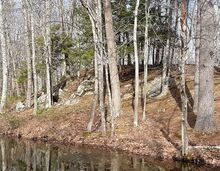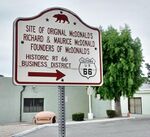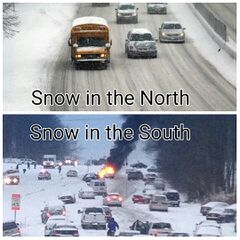Northeastern United States
Northeastern United States Yankeeland De Nawhth | |||
|---|---|---|---|
| |||
| Motto: Fuhgeddaboudit | |||
| Anthem: "Streets of Philadelphia" by Bruce Springsteen | |||
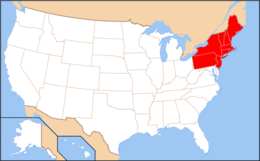 The Northeast is shown in red. Everything else is shown in white because Northeasterners don't think there's anything important out there. | |||
| Capital | The Big Apple | ||
| Official language(s) | Non-rhotic | ||
| Government | If you can quote the rules, then you can obey them. | ||
| National hero(es) | Abraham Lincoln, William Tecumseh Sherman, Ulysses S. Grant | ||
| Currency | Saltine cracker wraps, lobster rolls | ||
| Religion | Catholics with funny hats | ||
The Northeastern United States (or the Northeast) is a region of the United States distinguished by cool summers, cold winters, and frigid reception to outsiders. Its social groups are the most cohesive in America, exceeded only by the utter impossibility of breaking into them. The region offers industrial affluence, social homogeneity, and the nation's highest suicide rate. Can't have it all.
People from that region are called "Northeasterners" or "Yankees", because they dance to "Yankee Doodle" and cheer for the New York Yankees in baseball (except fans in the northeast half of the Northeast, whose two favorite teams are the Boston Red Sox and whomever the Yankees are playing against).
History[edit]
The Northeast was an integral part of the new nation that declared its independence from England. The Middle Colonies had fertile soil for grains such as wheat, while the fields of the aptly-named New England Colonies were mostly boulders (though their pine trees were pretty). Commerce solved these problems, and the Middle Colonies no more had to build houses of gingerbread than New Englanders had to eat rocks (unless they wanted to).
It only took the residents a couple generations to realize that associated with the harsh, rocky terrain were waterfalls which, apart from being idyllic, could turn wheels, which could turn shafts and gears and power entire woolen mills. In the wink of an eye, the most idyllic waterfalls were hidden from public view with a series of grimy brick buildings that would have been the length of several football fields, if the game had been invented yet. And these were hidden from view by dormitories and tract homes to house the workers. The game was invented, though, and teams with names like Mill City sprang up, which could not only please crowds but, when they stopped doing so, could move to any other mill city with no need to print up new handbills.
Slavery was practiced sporadically in the Northeast; a handful of farmers took advantage of the Constitution's provision not to talk about it for the first 32 years. Eventually, the practice of slavery died out in the Northeast; the compromise lasted not 32 years but four score and change, as Abraham Lincoln reckoned it. (The four scores were three touchdowns and one field goal, Mill City winning again.) However, when the compromise finally frayed and snapped, the feeling of slave-free superiority emboldened the Northeast to go to war against the Confederacy, rather than just let them wander away in peace. The Northeast then referred to itself simply as the North, so as to emphasize that it was not the South.
Geography[edit]
The Northeast always includes the six New England states (Connecticut, Maine, Massachusetts, New Hampshire, Rhode Island, and Vermont). New England is not that new (400 years old) and has nothing to do with England (this last having been insisted on quite forcefully). New York is often thought of as a Northeastern state, but is not in New England (despite having the word "New" in it, and being named after a place in England). The Census Bureau (see map above) extends the Northeast down to the Mason-Dixon Line, throwing in Pennsylvania and New Jersey (the southwestern Northeast) for good measure, but most northeastern Northeasterners would throw them back out if they could.
You could call anything a Northeastern state that is in the northeast quadrant of the continental United States, down to Virginia and over to Michigan, but you would probably be trying to put something over on someone, which Northeasterners often are. These other states are in regions of their own, such as the Mid-Atlantic States — which is a comparable misnomer, as none of them are in the middle of the Atlantic Ocean.
The states were not always as they are now. Massachusetts was in two pieces, so eventually the one that was down east, "on the maine" was broken off and became Maine, accessible only with several dollars of tolls payable to neither. Likewise, there was a gap approximately the size and shape of Vermont, which eventually got filled in by a state of the same name. These partitions and spackling jobs had nothing to do with the slavery question, which was redrawing maps further south.
Culture and demographics[edit]
The Northeast was originally populated by Italians, Greeks, and Eastern Europeans, while Germans and Nordic peoples continued migrating further into the interior. Northeasterners tend to be shorter and more swarthy than other Americans. Consequently, restaurant cuisine in the Northeast is far superior to that in the rest of the U.S., but high-school beauty queens tend to have teeth missing. Northeasterners who fly commercial with a transfer at O'Hare Airport in Chicago are amazed at a world whose people are so tall, blonde, and leggy. Many do not complete the round trip.
The Northeast remains the oldest part of the United States. Historical markers mark things more historic than the opening of a McDonald's (pictured). The Northeast has also had more time to plow into baffling pastimes, such as developing accents specific to individual areas. This includes the Boston accent, which is thick as chowdah; the New York City accent, used in movies by gangsters and politicians; the Mid-Atlantic accent, which is typically spoken in 1950s Hollywood rather than in the actual Mid-Atlantic; and in rural areas, Early Modern Elmer Fudd. Perhaps, someday, even Amarillo, Texas will decide on a letter of the alphabet never again to pronounce. It hasn't, yet. Citizens in the rest of the United States do not pronounce English to show where they are but where someone was, once.
Economy[edit]
The linchpins of the Northeastern states' economies include the following industries:
- Insurance, also finance, annuities, and other schemes of taking your money and promising to give it back to you someday. (The related racket of "government" is covered below.)
- Computer manufacturing once flourished in the Northeast, before touching down briefly in California on its way to Taiwan. Though the manufacturers have left, state governments still keep them afloat by purchasing an overpriced laptop or iPhone for every high school hipster.
- Donut shops, where customers sit at a bar and wash down sweets with coffee (black to avoid adding to their waistlines).
- Tourism, in which people visit to find out what the United States used to be like, back before we "transformed" it.
The bite-sized Northeastern states — each with its own legislature and courts — subject the traveler to sudden spikes in speed limits, traffic laws, signage, sales taxes, and trash-disposal procedures. A vacation is more interesting when everyone you meet is an American but they do everything wrong anyway. There were already centuries of history before the expressways were built, with centuries of claims, counterclaims, and feuds, and this explains why few of the expressways are straight and some stop abruptly at traffic lights. Though the Interstate highway system was designed to be free of charge, federal exemptions give several Northeastern states the right to charge tolls, for a further feeling of foreign-ness and perhaps another sample of the local dialect. Another consequence of states' rights is that the traveler may reach the city of Salem only to find the hotel reservation is an hour away in the next state's Salem.
The region is deficient in the field of agriculture, except for upstate New York and western Pennsyltucky, where the Amish need an industry where nothing has an on/off switch.
Climate[edit]
The weather of the Northeast, exemplified by the blizzard and the reflexive multi-day electricity outage that follows it, is horrible, except perhaps compared to everywhere else in the United States. In certain parts of the Northeast, the ocean slightly moderates the temperature, when it isn't providing moisture for extra feet of snow. By the same token, the region mostly avoids tornadoes and hurricanes, and is blessed as its many insect and rodent pests hibernate or die. That means months after months with no cockroaches or skunks at all. These pestilences generally start the next year with renewed destructive vigor but decimated populations.
Moreover, horrible weather prepares Northeasterners for horrible weather. A snowstorm is more disruptive than most events that send other states' governors to Washington, D.C. to seek a Presidential Emergency, but Northeasterners handle it by second nature. Most pick-up trucks are fitted for plows, also a few bicycles and skateboards, and any Northeasterner who has no contract for the season can flag down a passing vehicle for one-time service. Plowing à la Uber is not quite as cheap as having a go-to contractor, nor as gentle on the blacktop. A large majority knows how to drive at reduced speeds on snow and ice (not that they ever do so). By far the most dangerous vehicle in the Northeast is a car with Florida plates (as it is, too, in Florida). Public services, such as schools, operate despite several feet of snow, whereas places like Washington nervously shelter-in-place over flurries.
Politics[edit]
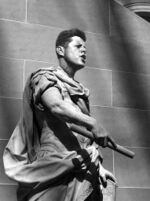
Speaking of seasonal pestilences, one nuisance the Northeast is virtually free of is Republicans. The state legislatures are mercifully free of partisan squabbles, as the Democratic Party has a monopoly on squabbles; also on nepotism, payola, and transporting underage girls across state lines.
The various family dynasties, such as the Kennedys and Cuomos, make the Northeast a veritable incubator for politicians to reach the national level. The Bush and Clinton dynasties were interstate rackets but had a toehold in the Northeast. On the other hand, the Adams and Roosevelt dynasties are much reduced in influence, no longer moving polls but merely pushing up daisies.
| ||||||||||||||||||||

